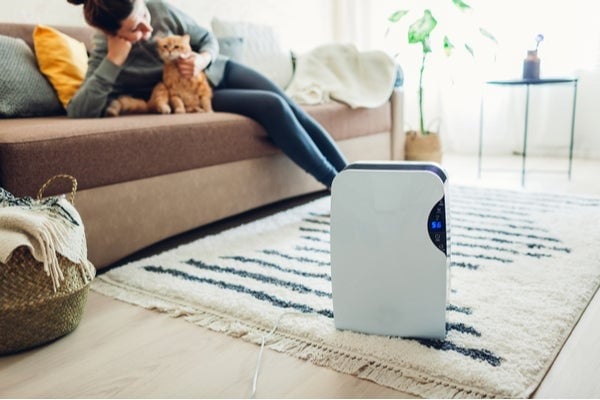Do you live in a humid or muggy climate and notice a lot of condensation on windows and mirrors? Does anyone in your household suffer from allergies or asthma? Have you experienced mildew or mold issues? If you answered yes to any of these questions, your home could benefit from a home dehumidifier. Let’s talk about dehumidifier benefits.
What Does a Dehumidifier Do?
A dehumidifier works by removing excess moisture and humidity from the air. While humidity levels can vary due to changing seasons, weather, energy use, air circulation, and other factors, most experts agree that keeping the relative humidity level between 30 percent and 50 percent is a good goal, with 45 percent being best for comfort and health. According to Consumer Reports, humidity levels above 50 percent can host dust mites, mildew, and mold, which triggers allergies and other health problems. It’s important to make sure dark areas like your basement stay below 50 percent humidity since they don’t have access to sunlight or natural air from outside.
You can gauge your home's relative humidity level with a device called a hygrometer, which can be purchased at hardware and home improvement stores. In summer months, you can expect the average interior humidity to be higher, and it will likely be lower in winter months. If your hygrometer is consistently getting readings above 50 percent, a home dehumidifier might be a good investment.
How to Choose a Dehumidifier
There are two dehumidifier types:
- Compressor dehumidifiers: These are the most common dehumidifiers and are usually the most affordable. They work by passing the damp air over a chilled coil, using condensation to suck the moisture out into a disposal tank. The air is then reheated by a warming coil and sent back out.
There are some drawbacks to the compressor version. They tend to be loud and bulky and work best in warmer climates—since they use condensation, the air must be relatively warm upon entering the machine.
- Desiccant dehumidifiers: These work by removing the moisture via a desiccant wheel, which is then dried with an internal heater. The desiccant dehumidifier is quieter and tends to last longer than compressor dehumidifiers. You don’t have to empty a disposal tank, and it doesn’t require refrigerant.
Desiccant versions tend to be pricier, and the dehumidifier energy usage is a little more than compressor humidifiers. But if you live in a colder climate, it may be the way to go.
The average whole house dehumidifier cost is anywhere between $1,300 and $2,800. The cost to run a dehumidifier is from 3 to 16 cents an hour on average. You can pick up a small room version for only a couple hundred dollars, but the dehumidifier benefits may make you want to splurge on one for the whole house.



